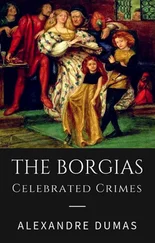Duke Alfonso was to be absent from Ferrara for a considerable part of the next three years, first leading Julius II’s armies against Venice, which was resoundingly defeated in May 1509 at the Battle of Agnadello; when Julius II abruptly changed sides the following year, to ally himself with Venice and to launch an attack on the French forces in Italy, in order to drive the ‘barbarians’ back beyond the Alps, Alfonso remained loyal to Louis XII, and the pope used this as the excuse he needed to excommunicate the duke and deprive him of his fief before moving north, leading his armies in person, to attack the duchy of Ferrara.
‘Having been unable to separate the Duke of Ferrara from his loyalty to the French King,’ wrote Guicciardini, ‘the Pope had made every effort to occupy the duchy, pretending that he had done so on account of a dispute over the taxes and tolls on salt.’ For Alfonso, the autumn of 1510 was exceptionally busy as he strengthened his fortifications, something about which he knew a great deal. Nevertheless, Modena soon fell to the papal forces, and they now marched on to lay siege to Alfonso’s strategic fortress of Mirandola, which had been garrisoned with the help of French soldiers.
Julius II had already proved himself a formidable opponent on the battlefield when, in 1506, having dismembered Cesare’s empire, he had turned his attention to Bologna, conquering the city and removing Giovanni Bentivoglio from power. He returned to Rome in triumph. The Venetian envoy thought that never had any emperor or victorious general received so remarkable a welcome. A few thoughtful men, however, regretted that the Vicar of Christ should resemble more the Lion of Judah than the Lamb of God. The Dutch scholar Erasmus, himself ordained a priest, wrote ironically of Julius II’s entry into Bologna as though in the pope’s own words: ‘Ah, would to God you had seen me borne aloft into Bologna! The horses and chariots, the marching battalions, the galloping commanders, the flaming torches, the pretty page boys, the pomp of bishops and glory of cardinals… and I borne aloft, head and author of all!’ His satirical attack on Julius II was vicious: ‘Your name suits you perfectly,’ he wrote, likening the pope to Julius Caesar. ‘You unjustly seized tyrannical power, despising and ignoring the gods, and plunging your country into war’; the only difference Erasmus could see was that Julius II was of common stock.
In January 1511 Julius II arrived at Mirandola to oversee in person the siege of the castle; he took up lodgings, according to Guicciardini, ‘in a farmer’s hovel where he was within range of the enemy artillery.’ He went about the camp in the bitter cold and driving snow, his armour concealed by a white cloak, his head in a sheepskin hood, cursing his enemies, moving his quarters when they were hit by cannonballs, and shouting orders to his captains, his energy and enthusiasm ‘not chilled in the slightest degree,’ added the historian, ‘by the bitter cold which his troops were scarcely able to endure.’
Inspired by his restless energy, his men breached the walls of Mirandola, their task much eased by the icy cold that had caused the water in the moat to freeze deep enough to bear the weight of the papal troops. With no chance of relief, the castle surrendered. This fresh victory encouraged other cities to join the pope. Spain came to his aid against the French, who were Duke Alfonso’s principal allies, while both Parma and Piacenza, abandoned by the French, declared themselves willing to join the Papal States. Julius II annexed them immediately, announcing that he hated the Spanish quite as much as the French, and that he would not rest until they had been driven out of the peninsula too.
Ferrara, however, was to prove a harder proposition for the bellicose pope. On November 28, 1510, the French army arrived at Ferrara to help the defence of the city. Two days later, the duke, in the presence of the French captains, had addressed the ‘courtiers, citizens and artisans’ who had gathered early in the evening in the town hall to hear their duke speak. The chronicler Zerbinati takes up the story:
He told the people how he was expecting the Pope’s army to arrive soon and asked the people to remain as faithful to him as they always had been to the house of Este, and he promised the people that he would not abandon them, as he had been abandoned by everyone except by the French, and that if they stayed faithful to him he was sure of victory because the city was strong, that they would fortify it and that we were well supplied with artillery and with food and with a large population; then he repeated that if the people kept their trust in him then he had no doubts at all… Messer Antonio Costabili replied wisely that his people had always been most faithful to the house of Este, and for the future and for the present they would always be so, and that he was not to worry about this because the people were ready and prepared to fight against his enemies and everyone started to shout: Duke Alfonso! Duke Alfonso! And so His Lordship and the French captains left the room well satisfied with the populace who now prepared for the arrival of the enemy army in Ferrara.
The following day Duke Alfonso had published a decree ordering all warehouses and shops to close for the week and for everyone to work instead on fortifying the city. And then they waited for the enemy to arrive, going about their business as normally as possible while the winter months passed and Julius II’s forces fought relentlessly for the possession of Mirandola, knowing that once that fortress had fallen, it would be their turn next.
On Maundy Thursday, April 17, the chaplains of the cathedral held the customary confirmation service behind closed doors, ‘which they did, not having permission from the Pope to do because of the excommunication,’ reported the chronicler Zerbinati, who added in the margin of his notebook that ‘I was told about this, because I was not there.’
The winter of 1511 had been unusually long and hard, ‘the greatest cold, the thickest ice and the heaviest snow that I have ever seen,’ commented Zerbinati, adding that ‘the winter has lasted for so long that today, the last day of April, we are still lighting our fires and we are still wearing our fur-lined coats.’ Three weeks later, however, came news that warmed the hearts of the brave populace: the Bolognese had rebelled against Julius II, and the Bentivoglio were once again in power. The celebrations that night were exceptionally loud — bells, fireworks, cannonades, shouting, songs, youths roistering on the streets brandishing branches of trees on which blossoms had begun to bloom — to rejoice at the defeat of the mighty papal army ‘which has threatened us all the past winter.’ The next day ‘all the shops were closed, as if it were a Sunday.’
Throughout these difficult years while Alfonso had been frequently absent, fighting first for Julius II and then against him, it was Lucrezia, his duchess, who took his place as ruler of the city, writing regular letters to him, sometimes as many as three a day, reporting the news from the marketplace, the gossip at court, planning policy, and asking his advice. She had pawned her jewels to raise money for her husband and also managed, in what must have been exceptionally difficult circumstances, to preside over their court, acting as a gracious hostess to the many French nobles who had come to Ferrara with the French army and were quartered in the ducal palace or in the residences of the courtiers. ‘She is a pearl,’ one Frenchman remarked; ‘there has never been such a wonderful duchess,’ he extolled, praising Lucrezia’s beauty and benevolence, her kindness and charm, and, he added, ‘a great service to her husband.’
— CHAPTER 28 — The Death of the Duchess
Читать дальше











